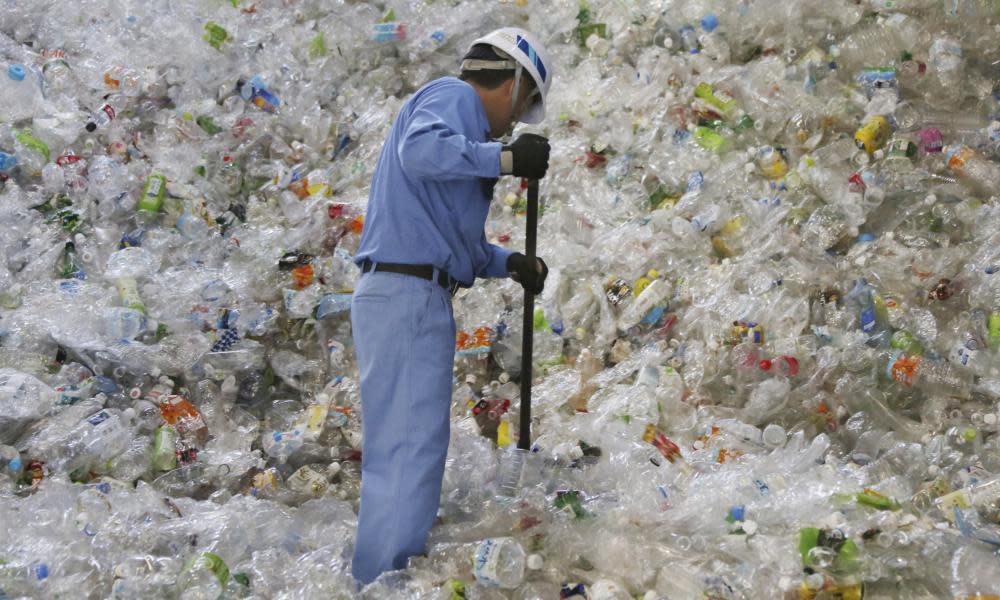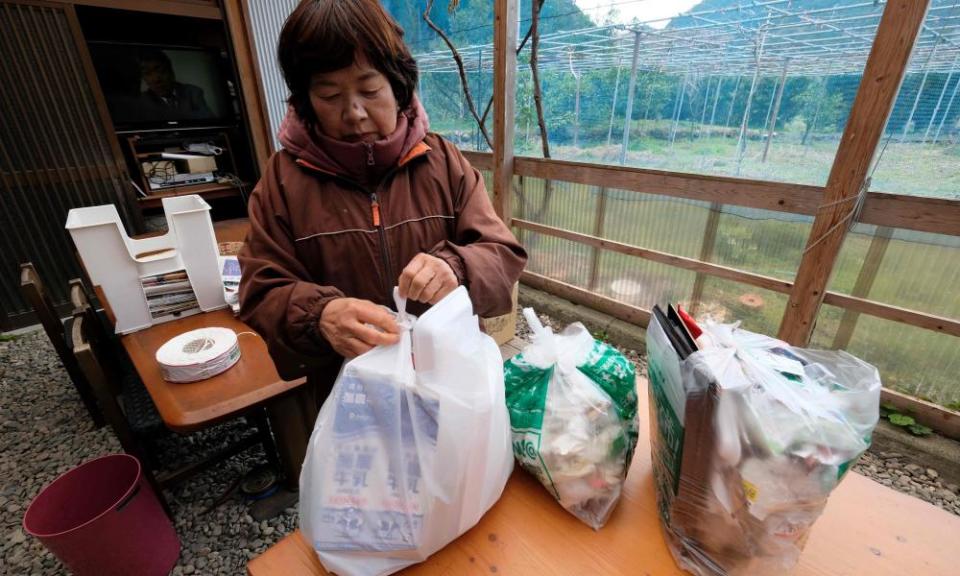Japan's plastic problem: Tokyo spearheads push at G20 to tackle waste

One of the joys of traveling on Japan’s bullet trains is tucking into an ekiben “station bento”. But it is also a reminder of the country’s addiction to plastic.
The Guardian’s ekiben, eaten en route to this week’s G20 summit in Osaka, contained no fewer than nine individual pieces of plastic, from functional sachets for sauce and mustard to purely decorative slivers of fake grass.
In the run-up to the gathering of world leaders, Japan has vowed to spearhead international efforts to tackle plastic waste – an environmental catastrophe its citizens said they wanted prioritised at the two-day meeting, which opens on Friday.
But campaigners say Japan – the world’s second-biggest producer of plastic waste per capita after the US – must also do more to deal with the rubbish piling up on its own doorstep.
Japanese consumers get through about 30bn plastic shopping bags a year. Osaka Bay, a stone’s throw from the G20 venue, contains an estimated three million plastic shopping bags and six million other pieces of plastic, according to a study by Osaka University of Commerce, cited by Bloomberg.

While the European parliament passed legislation in March to ban single-use plastic in all member states by 2021, Japan, along with the US, failed to sign the G-7 plastics charter last year, which would have committed it to reuse, recycle and collect all plastic products by 2030. Instead, the government has committed itself to a less ambitious 25% reduction in single-use plastic by 2030.
A cultural preference for elaborate packaging is partly to blame – consumers associate carefully wrapped items with luxury and high-end customer service. Aesthetically pleasing but unnecessary packaging in supermarkets, shops and platform bento stands, have left Japan struggling to cope.
Why the sudden focus on plastics?
Mankind produces roughly its entire body weight in plastics every year. But the vast majority of it is either not recycled, unrecyclable, or doesn't get reused once it's been recycled. Volumes ending up in the natural environment are surging. Plastic can take as much as 500 years to decompose.
What are the implications?
Plastic is ubiquitous – and often deadly. It kills sea creatures that eat it but cannot digest it. It gets into the human food chain by contaminating the fish that we eat. It is even in our tap water. There is no science about the long-term impact of humans ingesting plastic.
What is to be done?
Taxing plastic bags – or even banning them outright as Kenya has done – has changed consumer and producer behaviour. But what next? Deposit return schemes for plastic bottles work well in several countries. Charging for one-time coffee cups also seems to be on the agenda. But the real solutions may not be top down but ...
... bottom up?
Yes. Grassroots movements led the way on plastic bags, and have spawned others such as Refill, which emphasises reusing bottles, and A Plastic Planet, which urges plastic-free aisles in supermarkets. Popular culture remains hugely important: it's just possible that the British series The Blue Planet has changed attitudes overnight.
Japan once sent a 1.5m tonnes of plastic waste to China every year until Beijing banned the imports in 2017, and is now redirecting it to countries in Southeast Asia that are poorly equipped to handle and process the waste, exposing people to environmental and public health problems.
The proportion of plastic bags among plastic waste is not big, but charging would be symbolic
Yoshiaki Harada
Determined not to become Asia’s plastic dumping ground, countries such as Malaysia and the Philippines are now turning back the shipments. As a result, plastic waste is building up in Japanese warehouses, and incinerators are at full capacity.
The government will require supermarkets and other shops to charge for disposable bags from next April, a move critics said does not go nearly far enough given that many other countries have already banned plastic bags from supermarkets.
The environment minister, Yoshiaki Harada, conceded the measure, which will leave retailers to set the price of a bag, would do little to address the damage single-use plastics are inflicting on the marine environment.
“The proportion of plastic bags among plastic waste is not big, but charging would be symbolic,” of Japan’s determination to reduce plastic waste, he told reporters earlier this month.
G20 environment ministers meeting in Japan earlier this month agreed on an international framework that calls on countries to take voluntary steps to reduce single-use plastics, but stopped short of setting numerical goals.
“Marine litter, especially marine plastic litter and microplastics, is a matter requiring urgent action given its adverse impacts on marine ecosystems, livelihoods, and industries including fisheries, tourism, and shipping, and potentially on human health,” they said in a communiqué.
Local authorities and companies are taking more decisive action. The town of Kameoka, near Kyoto, will ban almost 800 retailers from handing out plastic bags from next year – with violators potentially facing fines - while the village of Kamikatsu is striving to become completely waste-free by next year.
Seven-Eleven Japan said this week it will start selling onigiri rice balls in plant-based wrapping from as early as next month. The firm’s 21,000 stores nationwide sell 2.2bn onigiri a year. It has said it will also replace all plastic shopping bags with paper by 2030 and all plastic packaging with paper, biodegradable or other reusable materials.
Convenience store operator Family Mart now uses recycled plastic for its cold noodle range, while the Chinese restaurant chain Ohsho said it would eliminate single-use plastic straws and spoons at all of its 700-plus restaurants from next month.
“Individuals taking action on single-use plastics is one thing,” said Hiroaki Odachi of Greenpeace Japan. “But if more businesses did the same the impact would be much greater. But the petroleum industry has been lobbying hard against change.”

 Yahoo News
Yahoo News 
